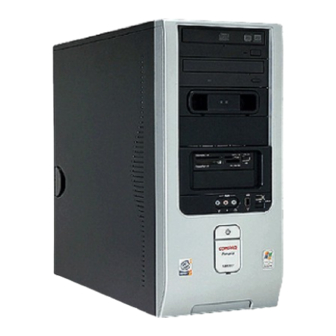
HP Compaq Presario,Presario SA4000 Supplementary Manual
Hp compaq presario,presario sa4000: supplementary guide
Hide thumbs
Also See for Compaq Presario,Presario SA4000:
- Maintenance and service manual (278 pages) ,
- User manual (239 pages) ,
- Hardware and software manual (223 pages)
Table of Contents
Advertisement
Quick Links
Advertisement
Table of Contents

Summary of Contents for HP Compaq Presario,Presario SA4000
- Page 1 Upgrading and Servicing Guide...
- Page 2 HP shall not be liable for errors contained herein or for incidental or consequential damages in connection with the furnishing, performance, or use of this material.
-
Page 3: Table Of Contents
Table of Contents Safety Information ... 1 Opening and Closing the PC ... 1 Removing and Replacing Drives ... 3 Adding Memory ... 7 Removing or Installing an Add-in Card... 9 Replacing the Battery ... 10 Preparing the PC ...1 Before Opening the PC ...1 After Closing the PC...2 Removing the Side Panel ...2... - Page 4 Upgrading and Servicing Guide...
-
Page 5: Safety Information
Safety Information This product has not been evaluated for connection to an “IT” power system (an AC distribution system with no direct connection to earth, according to IEC 60950). WARNING: Please read “Safety Information” in your user documentation before installing and connecting your computer to the electrical power system. -
Page 6: After Closing The Pc
After Closing the PC To avoid injury and equipment damage, always follow this procedure in this order after closing the PC: 1 Reconnect the power cord. CAUTION: To reduce the risk of electrical shock, fire, or damage to the equipment, do not plug telecommunications or telephone connectors into the network interface card (NIC) (labeled as an... -
Page 7: Replacing The Front Panel
Replacing the Front Panel 1 Align the right side of the front panel with the slots on the right side of the chassis front, and press the right side of the front panel into place. 2 Swing the front panel closed, and then press the left side of the front panel to latch it into place. -
Page 8: Replacing Or Adding A Drive
Disconnecting the diskette drive cables Disconnecting the memory card reader drive cables 4 Release the drive from the chassis by lifting the tab (1) on the latch drive bracket and then sliding (2) the drive forward out of the bay. (The latch drive bracket secures the drives in their respective positions in the chassis.) 5 Pull the drive out of the drive bay. -
Page 9: Removing A Hard Disk Drive
3 Make sure the jumper on a new optical drive is in the CS (cable select) position. Your drive may vary from the illustration. Cable select jumper 4 Install the guide screws on the sides of the new drive. (The optical drives have two screws on each side;... -
Page 10: Replacing Or Adding A Hard Disk Drive
CAUTION: Back up your personal files on the hard disk drive to an external storage device, such as a CD, before removing the hard disk drive. Failure to do so will result in data loss. After replacing the hard disk drive, you need to run System Recovery using the recovery discs to load the factory-installed files. -
Page 11: Adding Memory
4 Slide the drive into the cage, making sure to align the guide screws with the guide slots. Push the drive into the cage and snap it into place. 5 Reconnect the power and data cables to the drive. Connecting the Serial ATA hard disk drive cables Connecting the Parallel ATA hard disk drive cables... -
Page 12: Removing A Memory Module
Removing a Memory Module 1 Complete the procedures to prepare the PC, and to remove the side panel. See “Opening and Closing the PC“ on page 1. 2 Gently lay the PC on its side. 3 Locate the memory module sockets on the motherboard. -
Page 13: Removing Or Installing An Add-In Card
Removing or Installing an Add-in Card An add-in card is a circuit board, such as a PCI or an AGP card, that fits into a PC add-in card slot. Your PC contains several add-in card slots that can be used to add components to your PC. -
Page 14: Replacing The Battery
Replacing the Battery A lithium battery on the motherboard provides backup power for the PC’s timekeeping capability. The battery has an estimated life expectancy of seven years. When the battery starts to weaken, the date and time may be incorrect. If the battery fails, replace it with a CR2032 lithium battery (3 V, 220mAH rating) or an equivalent battery. - Page 16 Printed in...







